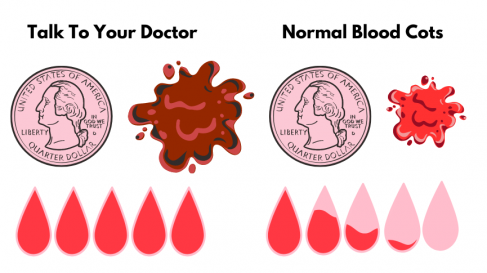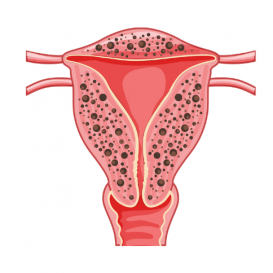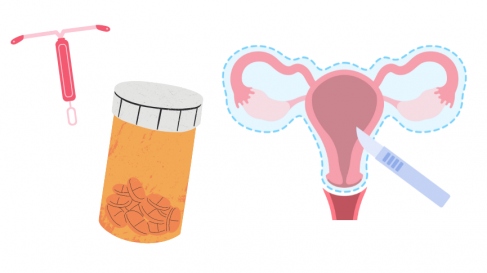Regardless of having a interval month-in and month-out, there are nonetheless some questions that stay unanswered about this time of the month.
This might partly be as a result of one didn’t obtain sufficient (or any) training concerning the menstrual cycle at house or at college, or as a result of one notices one thing throughout “that point of the month” that’s out of the bizarre or possibly even scary.
Like menstrual clots – Are they regular and why do they occur?
Throughout your month-to-month interval, your uterine lining sheds which implies that blood expels by means of the vagina.
This lining is made up of blood, blood byproducts, mucus, and tissue.
This blood and tissue is pretty thick, so the physique releases anticoagulants which assist skinny the blood to make it simpler to go.
However, in case your blood circulate outpaces your physique’s means to supply anticoagulants, menstrual clots happen.
As Salena Zanotti, MD, says:
“Blood clots will type anytime you could have a specific amount of blood that simply sits there. Blood clots are purported to occur to a point, like whenever you minimize your self. However with interval clots, what occurs is for those who’re having a superb quantity of bleeding, it collects inside your uterus and because it sits there it’ll make a clot.”
For those who’re somebody who experiences menstrual clots, seeing a specialist is a good suggestion if:
- You go a number of blood clots which can be larger than 1 / 4
- You’ve gotten heavy menstrual bleeding (you modify your tampon or pad each two hours or much less) for a number of hours
“Regular” blood clots are normally:
- Smaller than 1 / 4
- Rare
- Occur close to the start of your interval
- Shiny or darkish pink in look
Underlying causes of menstrual clots
Now that we all know what occurs inside the physique when menstrual clots type and are launched, are there any underlying causes to pay attention to?
Certainly, there are some bodily and hormonal components that may have an effect on your blood circulate and the formation of blood clots.
Uterine obstructions
If one has a situation that enlarges the uterus, extra strain may very well be positioned on the uterine wall. This might result in heavier bleeding and menstrual clots.
Obstructions may intrude with the uterus’s means to contract. That implies that it’ll take longer for the blood to exit the vagina so it might begin to pool inside the uterine cavity and type clots.
An imbalance of hormones
All through one’s menstrual cycle, hormones are constantly altering, rising and falling. This doesn’t imply that there’s an imbalance nonetheless. In truth, this mix of hormonal modifications make for the right situation for conception.
But when somebody suffers from an imbalance of hormones (maybe from circumstances akin to perimenopause, stress, important weight reduction or acquire), then there may very well be a change in how a lot blood is expelled, and if it kinds clots or not.
Adenomyosis
This situation causes one’s uterus lining to develop into the muscular wall of the uterus. And when it occurs, the uterus can develop as much as two to 3 instances its regular dimension.
Throughout adenomyosis, the endometrial lining and the uterine wall may be a lot thicker than regular. This, in flip, can lead to heavier durations and blood clotting.
Enlarged Uterus
If one has a much bigger uterus (oftentime after being pregnant), it has a much bigger house for blood to pool earlier than it’s expelled.
Which means blood clots might type because the blood sits inside the uterus, ready to exit the physique.
Miscarriage
Within the unlucky occasion of a miscarriage, it is not uncommon to expel quite a lot of blood and blood clots.
But when an individual doesn’t know that they’re pregnant, they might simply assume it’s a heavy interval.
Thyroid points
Your thyroid is a gland in your neck, and it’s answerable for producing and distributing hormones. So, if one is experiencing a thyroid situation, it might imply chaos for his or her menstrual cycle.
Some thyroid circumstances embrace hyperthyroidism and hypothyroidism (when the physique produces an excessive amount of or too little of the thyroid hormone).
Endometriosis
Endometriosis impacts round 10% of ladies around the globe. It’s a situation that causes the tissue of the uterine lining to develop outdoors of the uterus.
If one resides with endometriosis, they might expertise heavier and extra painful durations accompanied with blood clots.
Tips on how to diagnose menstrual clots
In case you are experiencing menstrual clots regularly which can be larger than 1 / 4, step one can be to go to your healthcare supplier.
They are going to ask you many questions on your cycle in addition to issues which will have an effect on your cycle.
For instance, they might ask you for those who’ve ever had pelvic surgical procedures, for those who use contraception, or for those who’ve ever been pregnant.
After this, they might run some blood assessments to search for any hormonal imbalances. And/or they might conduct an imaging take a look at (akin to an MRI or ultrasound).
Tips on how to deal with menstrual clots
There are some options which can be efficient in lowering or stopping menstrual clots:
- Hormonal contraceptives: If one is on hormonal contraceptives, the expansion of the uterine lining may very well be inhibited. An intrauterine machine (IUD), for instance, can cut back the quantity of interval blood by as much as 90%. And the contraception tablet might cut back it by as much as 50%.
- Treatment: Drugs that belongs to the category of medication often known as antifibrinolytics might have a optimistic impact relating to menstrual clotting. A healthcare supplier may also counsel that you just take nonsteroidal anti-inflammatory medicine, which can support in much less bleeding and extra consolation.
- Surgical procedure: A dilation and curettage (D and C) process is usually performed after baby beginning or a miscarriage. It will also be performed as a way to find the reason for heavy menstruation and blood clots. This process received’t remedy heavy bleeding, however it might present much less bleeding for a couple of months. One other surgical procedure some might go for is a hysterectomy. That is when the uterus is eliminated, and one won’t be able to conceive nor will they’ve any month-to-month durations.
So, whereas menstrual clots is usually a trigger for concern, there are a couple of methods by which an expert might assist.
The underside line? For those who begin to discover that your durations are getting a lot heavier or that you just’re experiencing (extra) massive blood clots, looking for medical remedy is suggested.





